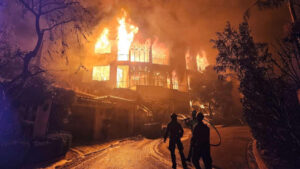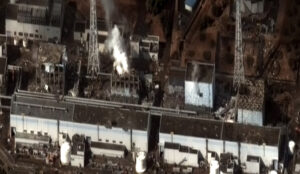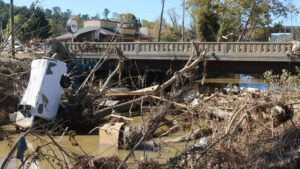By Najmedin Meshkati, University of Southern California
The Los Angeles fires are a national disaster of epic proportions. City officials, California Gov. Gavin Newsom and President-elect Donald Trump have traded accusations about what caused this crisis. But as an engineering professor who lives in Los Angeles and has studied extreme events and natural and human-caused disasters for over 40 years, I believe an event with so many lives lost and damages estimated at hundreds of billions of dollars demands a more substantive response.

Many problems have been cited as alleged root causes of this massive wildfire outbreak. They include mismanaged water resources, misallocation of firefighting resources, fire department funding cuts, poor risk management, reignition of past fires, and climate-driven dry conditions. Rumors and conspiracy theories have also abounded.
I have served as a member or adviser to national- and state-level investigations of events including gas leaks, oil spills, nuclear reactor accidents, refinery explosions and, most recently, aviation mishaps.
In my view, the Los Angeles fires call for a similar investigation that is technically sound, multidisciplinary, unbiased, apolitical and independent. U.S. Sen. Adam Schiff of California has called for convening such a review.
To quote a saying often attributed to Albert Einstein:
“Condemnation without investigation is the height of ignorance.”
Natural events + human responses
Natural disasters such as wildfires, earthquakes and tsunamis often serve as triggers. Devastating on their own, these events can have far more catastrophic aftermaths that are shaped by human choices. Nature delivers the initial blow, but a complex interplay of human, organizational and technological factors can either mitigate or worsen the consequences.
I believe human operators and first responders constitute society’s first and the very last layer of defense against death and destruction in the crucial moments following natural disasters and technological systems failures – serving as our immediate shield, intermediate mitigator and ultimate savior.
I saw this when I served on a National Academy of Sciences committee that studied the 2011 Fukushima nuclear accident in Japan. The explosions and radioactive releases at the Fukushima Daiichi plant were triggered by an earthquake and tsunami, but a Japanese high-level review concluded that this event was a “manmade disaster” – one born of human and organizational failure at the utility and governmental levels.

(Digital Globe/Wikimedia, CC BY-SA)
The fate of the Onagawa Nuclear Power Station, just 39 miles from Fukushima, was also notable. Although Onagawa was closer to the earthquake’s epicenter and faced an even more powerful tsunami, the reactors there – which were identical in type and age to Fukushima’s and subject to the same regulations – emerged almost unscathed. This stark difference demolished any argument that Fukushima’s failure was inevitable, an act of God or purely nature’s fault.
High-level commissions have reviewed similar disasters in the United States. For example:
– The President’s Commission on the Three Mile Island nuclear accident in 1979 produced the landmark Kemeny Report, which concluded that the accident was primarily caused by human factors, including inadequate operator training and confusing procedures, rather than equipment failures alone. The report strongly criticized the Nuclear Regulatory Commission, which regulates the nuclear power industry, and recommended a complete restructuring of the agency. It also called for better safety measures, operator training and emergency preparedness in the nuclear industry.
– Independent commissions investigated the explosions of the Challenger space shuttle in 1986 and the Columbia space shuttle in 2003. They identified similar systemic issues behind these incidents, even though they occurred 17 years apart, and provided overlapping recommendations to improve NASA’s safety culture and decision-making processes.
– Two national reviews – one by a blue-ribbon commission and the other by the National Academy of Engineering and National Research Council – investigated the 2010 BP Deepwater Horizon explosion and oil spill. This disaster killed 11 workers, seriously injured 16 others and released an estimated 134 million barrels of oil into the Gulf of Mexico.
Both reports concluded that BP’s poor safety culture and practices, along with technical failures, lax regulation and inadequate inspections, had contributed to the well blowout. Both commissions made recommendations for improving the safety of offshore drilling.
Analyzing the Los Angeles fires
Based on my research and experience, I believe only a high-level independent investigative commission can fully unravel this disaster’s interconnected causes. Government agencies, regulatory bodies and legislative committees inevitably fall short in such investigations. They are constrained by jurisdictional boundaries and bureaucratic interests. Their efforts remain too narrow and inward-focused. And, crucially, they lack true independence.
Gov. Newsom has directed the Los Angeles water and public works departments to review why hydrants ran dry, which hampered firefighting efforts. But this inquiry focuses narrowly on water supply issues in the Pacific Palisades neighborhood. It does not address other blazes like the Eaton fire near Pasadena, which has caused even more damage.
The most straightforward way to set up a high-level review of the Los Angeles wildfires would be for the Trump administration and Congress to direct the National Academies of Sciences, Engineering, and Medicine and the National Research Council to establish an independent commission. The National Academies are private, nonprofit organizations created by President Abraham Lincoln in 1863 to provide the nation with independent, objective advice on complex problems. The National Research Council is the National Academies’ operating arm.
Typically, such studies are led by a prominent person of national distinction or a renowned scholar, and are carried out by a panel of national experts from academia, business, the public sector and nongovernmental organizations.
The National Academies have a reputation for producing independent, rigorous and nonpartisan studies. They screen members thoroughly for technical expertise and conflicts of interest. All of their studies go through formal peer review, which helps ensure that they are scientifically accurate and credible.
When the federal government requests a study from the academies, Congress provides funding through a relevant federal agency. For the Los Angeles fires, the federal sponsor might be the U.S. Department of Housing and Urban Development or the Federal Emergency Management Agency.
Could a study proposed and sponsored by Congress and the Trump administration be balanced and nonpartisan? In my view, if the National Academies produced it, the answer is yes. The academies have a strong track record of reviewing complex issues, including disaster planning, response and recovery, risk assessment and wildfires. And their recommendations have improved public policy.
Lessons for future disasters
I see the Los Angeles fires as a stark warning to communities nationwide. There is a widening gap between intensifying climate-induced extreme events that are becoming Earth’s new normal, and municipal planning, preparedness and response capabilities.

Meeting these unprecedented challenges requires a paradigm shift in public policy. To protect public safety, officials and planners will have to proactively confront scenarios that may recently have seemed unthinkable.
For example, while Southern Californians are accustomed to wildfires, Los Angeles County agencies were unprepared to fight several major fires simultaneously. Flooding in North Carolina from Hurricane Helene in September 2024 is another example. Rainfall totals across the southern Appalachians reached levels that would only be expected once in 1,000 years based on past records.
To be prepared for such events, government agencies at all levels will need to reimagine their approaches to hazard assessment, risk management and emergency response. I believe a balanced and thorough investigation of the Los Angeles fires could help communities across the U.S. reframe their thinking about planning for emergencies.![]()
Najmedin Meshkati is a professor of engineering and international relations at the University of Southern California.
This article is republished from The Conversation under a Creative Commons license. Read the original article. Banner photo: March Field Fire Emergency Services assists in fire suppression efforts against the Eaton Fire in the Altadena Neighborhood of Los Angeles on Jan. 11. (Tech. Sgt. Joseph Pagan/US Air National Guard, via Defense Visual Information Distribution Service).
Sign up for The Invading Sea newsletter by visiting here. To support The Invading Sea, click here to make a donation. If you are interested in submitting an opinion piece to The Invading Sea, email Editor Nathan Crabbe at ncrabbe@fau.edu.



